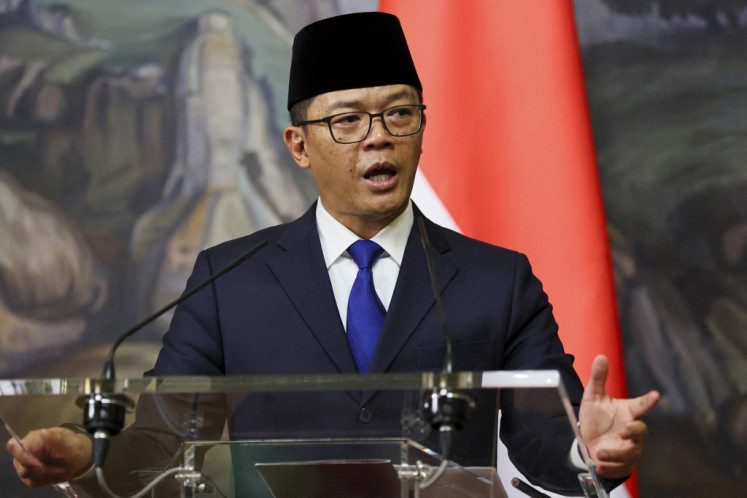Popular Reads
Top Results
Can't find what you're looking for?
View all search resultsPopular Reads
Top Results
Can't find what you're looking for?
View all search resultsAsia must show the way on climate change
For decades, Asian leaders largely ignored climate change
Change text size
Gift Premium Articles
to Anyone

F
or decades, Asian leaders largely ignored climate change. It's a Western problem, we said. They caused the problem by dumping greenhouse gasses into the atmosphere; let them clean it up. Instead, we Asian leaders focused on reducing poverty by growing our economies.
We were not responsible for the pollution, we argued; so we should not have to pay for it. Yes, Asia's industrialization was quietly building up toxic stores of carbon, but we were only following the rich world's prescription for success. Carbon equals growth, it said; and, like those who took up smoking on the doctor's orders, we were not to blame.
There was a time when the assumptions underpinning this line of thinking were true. Not anymore.
Climate change has become malignant. It threatens to blunt Asia's growth and upend our development. Climate scientists are increasingly certain that catastrophic weather events ' such as the 2011 floods in Thailand, one of history's costliest disasters, or last year's Typhoon Haiyan, which killed and displaced thousands of people in the Philippines ' will become more frequent and intense.
From small island states to delta settlements, Asia is the climate frontline. Seven of the 10 countries most vulnerable to climate change are in Asia and the Pacific. Millions of Asians are at risk. It falls to Asian governments, whose primary responsibility is to protect their citizens, to respond.
For decades, we left it to the West to solve the problem. And for decades they failed to do so. If Asian countries don't help push things forward, the United Nations climate summit in Paris next year ' where world governments are due to sign a crucial agreement to curb emissions ' could fail.
Three things need to happen.
Firstly, Asian Heads of Government should reposition their countries ahead of the Paris talks. We should instruct our negotiators to leave behind entrenched positions and work positively towards a global deal. It is difficult to admit, but sometimes we Asians have been less than helpful in the UN climate negotiations: Using arguments about 'equality' as a pretext to pollute; playing on post-colonial guilt to stymie progress; or claiming poverty when our per capita incomes sometimes rival Europe's.
One of the few positive outcomes from the Copenhagen climate summit in 2009 was the creation of a new group, the Cartegena Dialogue for Progressive Action: like-minded countries that refused to allow their differences in size, wealth or geography stand in the way of their mutual desire to curb climate change. We need to more of this kind of co-operative action if we are to seal a deal in Paris.
Secondly, Asian countries should focus on building clean economies to boost growth, increase wealth and reduce pollution. This isn't rocket science but it does involve planning and preparation: we need electricity grids that can accommodate vast quantities of renewable energy; infrastructure that promotes green vehicles; and regulations that encourage energy efficiency.
Many Asian nations are already leading the way. South Korea is investing 2 percent of gross domestic product (GDP) per year in green growth. China ' the world's biggest greenhouse gas emitter ' is also the biggest investor in clean energy. In 2012, it poured US$65 billion into renewables; over the next 20 years, it will add more clean energy than the US, Europe and Japan combined.
Switching from fossil fuels to clean energy already makes straight economic sense in many countries, in large part thanks to the collapsing price of renewable energy ' a trend likely to accelerate in future. The carbon/growth connection is being turned on its head, and Asian nations ' many of whom are still developing ' are well placed to get ahead of the curve.
Thirdly, Asian nations need to better protect their natural environments. Many Asian countries, preoccupied by short-term profits, are guilty of the rapacious destruction of the natural world. But as we are finding out, nature often provides the best form of defense against the storm surges, droughts and typhoons that will progressively worsen this century.
Mangroves and coral reefs protect coastlines from storms, while rainforests help regulate local weather patterns; protecting forests is one of the most effective ways to cut carbon pollution, and a healthy natural environment protects human health.
The threats to our nations are changing, and we must change accordingly. Huge standing armies, or high-tech weaponry, won't protect us from the next super-typhoon.
In the climate battle, our infantry will be mangrove forests and solar panels.
By strengthening our natural defenses, embracing clean growth, and leading the push for a global climate deal, Asian leaders can secure a more stable climate ' and safeguard our development.
Asian people need a climate deal, and the climate problem needs Asian leadership. It is time for Asia to show the way.
José Ramos-Horta is the former president of Timor-Leste. Mohamed Nasheed is the former president of the Maldives.









